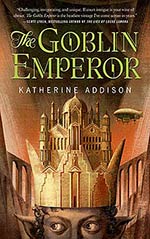
![]() attackofthebooks
attackofthebooks
12/14/2015
![]()
When the Emperor and all of his sons die in a tragic accident, Maia becomes the unexpected heir to the throne Katherine Addison's The Goblin Emperor. The son of a political marriage, Maia is half goblin, half elf, but more his mother's son than fathers, and so is more goblin than elf. After years living on the periphery of the empire, cast off by his father to live a tortured life at the hands of an exiled courtier, Maia finds himself thrust into the deadly intrigues of the imperial court, and it will take all of his wits and luck to learn the skill, develop the relationships, and navigate the politics that swirl around him. Everyone seems to be angling for an advantage, and Maia will have to learn to identify friend from foe before he ends up deposed or worse: dead.
I've struggled for months to come up with how to describe what I thought about The Goblin Emperor, Katherine Addison's first novel. For months I had seen it appearing at the top of best read lists for 2014, but without an easy way to categorize it, I put off reading.
That was a mistake. The Goblin Emperor is clever, intelligent, subtle, and a complex and beautiful thing. Woven with complex threads of fully imagined characters, cultures, and nations, Addison's novel faces the threat of overwhelming the reader with a high learning curve, and then obliterates any apprehensions with a story that is so real I wanted to read another in the same world as soon as I finished it.
So, yes, The Goblin Emperor is difficult to categorize, and that's part of why it took me a while to talk about why I liked it so much. There is steampunk, there is magic, and there are complex court politics. But none of those define the novel's genre so much as the deep character development of Maia at the center of the story. As he grows in the midst of complex and obscure politics and cultural norms around him, most of which he understands only slightly better than the reader at times, Maia becomes sympathetic and appealing, a protagonist you can cheer for, but whose success remains in doubt until the very end.
Addison's fully formed world (complete with its own social classes, linguistic twists, and religion) is only a supporting character in this breathtakingly fascinating bildungsroman allows the setting to lie in the background, fully textured, but without threatening to overtake the story.
The Goblin Emperor was intellectually stimulating, as well. With an imperial setting, Addison doesn't shy away from asking how a culture composed of individuals that are physically different (goblins and elves) but sexually and genetically compatible might develop and interact. As one who is heavily involved in my own home town's politics, but an avid fiction reader, this is one of the best and most fully imagined depictions of how politics might really look in a multicultural imperial setting.
In the interest of full disclosure, I hasten to note that my better half took a long time to get into The Goblin Emperor. But then, she didn't much enjoy Jonathan Strange and Mr. Norrell, either, which I also enjoyed immensely.
Katherine Addison has already pulled in a few of science fiction and fantasy's biggest awards for The Goblin Emperor, and she's up for the Hugo, as well. I'm still reading The Three-Body Problem, but right now The Goblin Emperor is my top pick for the award when I vote later this month. I hope she does well; The Goblin Emperor deserves it.
http://www.attackofthebooks.com/2015-hugo-nominee-the-goblin-emperor-by-katherine-addison/